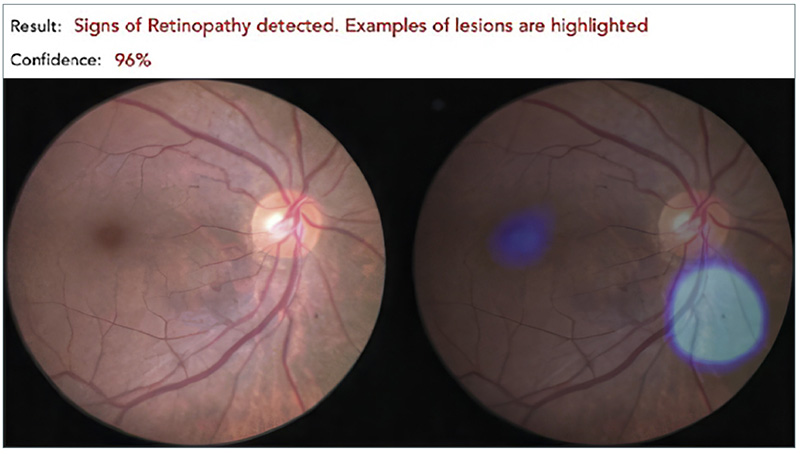Artificial intelligence in DR screening

Related content
AI is already being used in some diabetic retinopathy screening progammes. How does it work, and how will it affect the role of DR graders?
Artificial intelligence software can be used to grade diabetic retinopathy (DR) images. There are several commercially available AI tools for DR screening that have been proven to be just as accurate as human graders in detecting DR.1
In practice, a retinal image taken with a camera is submitted to the AI software. The software can be an integrated part of the camera itself, or it can function as a separate application on a computer or laptop which is connected to the camera. The AI system automatically grades the image and gives a result, typically in 30 seconds or less.
The majority of AI systems are based in the ‘cloud’ (on geographically remote servers), so they must be connected to the internet to produce a report.
Most AI systems give a simple response, such as “refer” or “don’t refer”, or they tell the user that the image is too low in quality and therefore ungradable. Some systems give a more detailed grade for DR, usually according to the International Clinical Diabetic Retinopathy (ICDR) severity scale.
It is very unlikely that AI will completely replace the role of DR graders in the near future. In part, this is due to the cost of cameras, software, and other technologies, as well as ethical and legal issues.2 In addition, human graders are also needed to provide quality assurance for a programme involving AI. Patients enrolled in a screening programme need to be counselled at the point of screening by an appropriately trained staff member whose role it is to explain the results and the next steps to take.
Overall, AI is likely to become a tool that will assist DR programmes and graders to deliver effective and patient-centred DR programmes, rather than becoming a replacement for graders.
References
1. Grzybowski A, Brona P, Lim G, et al. Artificial intelligence for diabetic retinopathy screening: a review. Eye. 2020; 34(3): 451–60.
2. Mathenge WC. Artificial intelligence for diabetic retinopathy screening in Africa. Lancet Digit Health. 2019;1(1):e6-e7.
